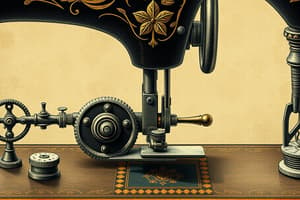Podcast
Questions and Answers
What common issue could cause the machine to be noisy?
What common issue could cause the machine to be noisy?
- Threads are caught in the hook mechanism. (correct)
- The bobbin is incorrectly sized.
- The needle clamp screw is too tight.
- The needle thread is too thick.
What could cause the needle thread to break?
What could cause the needle thread to break?
- The needle is too fine for the fabric being sewn.
- The fabric is being drawn to the back properly.
- The needle is bent or blunt. (correct)
- The needle thread is threaded correctly.
If a bobbin thread breaks, what is a likely cause?
If a bobbin thread breaks, what is a likely cause?
- The needle thread tension is too tight.
- The bobbin is extensively worn.
- The bobbin thread is not threaded properly. (correct)
- The fabric is too heavy.
What is a potential reason for skipped stitches during sewing?
What is a potential reason for skipped stitches during sewing?
What could cause seams to pucker during sewing?
What could cause seams to pucker during sewing?
Which issue is likely if the machine does not run smoothly?
Which issue is likely if the machine does not run smoothly?
What would NOT contribute to a needle breaking?
What would NOT contribute to a needle breaking?
What is a primary reason for the fabric not being drawn to the back when sewing is finished?
What is a primary reason for the fabric not being drawn to the back when sewing is finished?
Flashcards are hidden until you start studying
Study Notes
Machine Operation Issues
- Noisy operation may indicate threads caught in the hook mechanism.
- A packed feed dog with lint can disrupt smooth feeding of fabric.
Needle Thread Breaks
- Improper threading of the needle thread can lead to breaks.
- Tight needle thread tension jeopardizes thread integrity.
- Bent or blunt needles are a common cause of thread breaks.
- Incorrect needle insertion affects thread flow.
- Fabric not being drawn back post-sewing can cause tension issues.
- Thread weight too heavy or too fine can lead to needle thread breaks.
Bobbin Thread Breaks
- Improper threading of bobbin thread may result in breaks.
- Lint accumulation in the bobbin case affects performance.
- A damaged bobbin will hinder smooth rotation, causing thread issues.
Needle Breaks
- Incorrectly inserted needles can lead to breakage.
- Bent or blunt needles compromise sewing efficiency.
- Loose needle clamp screws can impact needle stability.
- Excessive top tension can put stress on the needle.
- Misalignment when sewing can create tension disruptors.
- Using a needle too fine for the fabric increases breakage risks.
- Twisting the pattern selector dial while the needle is engaged can cause damage.
Skipped Stitches
- Incorrect needle insertion causes stitches to be skipped.
- Dull or bent needles fail to create consistent stitches.
- Unsuitable needle or thread combination leads to production flaws.
- Not using a ‘Blue-tip’ needle for stretch or fine fabrics increases skipped stitches.
- Improper threading of needle thread can lead to inconsistencies.
Puckered Seams
- Tight needle thread tension may lead to puckered seams.
- Incorrect machine threading disrupts thread tension and alignment.
- Using a needle that is too heavy for the material can lead to puckering.
- Coarse stitching on lightweight fabric worsens seam appearance.
- Placing a sheet of paper under lightweight fabrics can prevent puckering.
Looping Stitches
- Loose needle thread tension results in loops forming below the work.
- Using the incorrect needle weight for the thread can contribute to looping issues.
Poor Fabric Feeding
- Lint accumulation in the feed dog hampers fabric movement.
- Fine stitches may obstruct smooth feeding of fabric.
Machine Malfunction
- Ensure the machine is plugged in to facilitate operation.
- Threads caught in the hook race must be addressed for functionality.
- Disengaging the clutch knob during bobbin winding prevents operation.
Unbalanced Buttonhole Stitches
- Work being pulled or held back during sewing can lead to imbalanced buttonhole stitches.
Studying That Suits You
Use AI to generate personalized quizzes and flashcards to suit your learning preferences.




